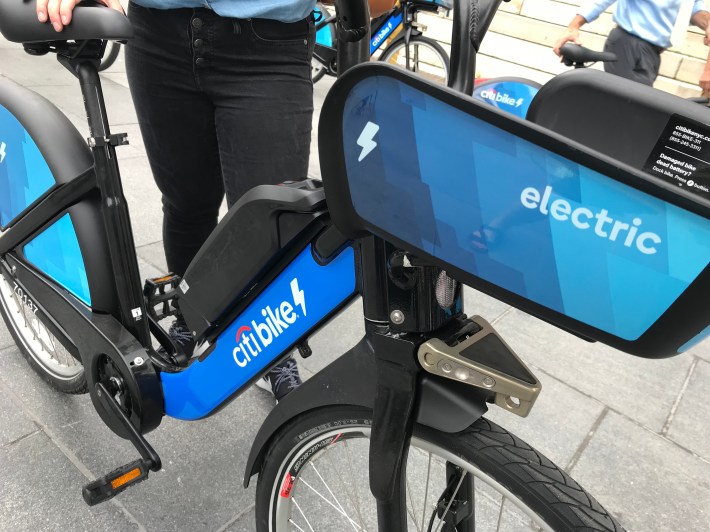Not so fast! Citi Bike's speedy electric-assist bikes will remain grounded for the foreseeable future.
The Lyft-owned company told Streetsblog that it is still working with its supplier to figure out how to repair the locking front wheel problem that led all 1,000 e-bikes to be pulled from New York streets this weekend. The same model e-bikes were also grounded by the Citi Bike counterparts in Washington, D.C. and the San Francisco Bay area.
The company said it had experienced a "small number" of reported incidents, but since Citi Bike revealed its troubles early Sunday, many users have come forward to describe the problems first-hand.
A Department of Transportation official said the city will be patient — as long as the Citi Bike fleet size does not dip far below the mandated 12,000 bikes. For now, Citi Bike has partially supplemented its fleet with non-electric bikes, which the company calls its "classic" bike.
Citi Bike is required by contract to have 97 percent of the fleet — or 11,640 bikes — available every day. On Monday, only 10,421, or 87 percent, were available for use, according to the definitive world bikeshare map created by Oliver O'Brien.

On Monday, Streetsblog asked Mayor de Blasio if the city has made plans to take over the Citi Bike system, which is one of the city's most-used forms of public transit, but he wasn't playing along.
"My understanding is that they were able to quickly replace a lot of those bikes," the mayor said, possibly referring to the redeployment of Citi Bike classics. "They addressed it quickly, they informed us quickly, put replacements in place on a wide scale, so I don't think it has larger ramifications at this point. We're certainly going to look at it to see if there is anything more we need to know, but I don't draw a bigger conclusions at this point."
The mayor also said, "We haven't seen a lot of this kind of problem with Citi Bike before," but it is hardly the first time the company has faltered. Last year, Streetsblog reported exclusively that more than 40 percent of the bikes in the system were pulled from the streets in a repair crisis. It took more than a month for Citi Bike to fix the problem.
Then, as now, the mayor declined to hit the company with sanctions for missing its fleet-size target. The company could have been on the hook for more than a million dollars in fines.
Last year, during the repair crisis, Council Member Justin Brannan called on de Blasio to allow more bike share companies to compete with Citi Bike, which has not expanded very far beyond its main Manhattan/Brownstone Brooklyn footprint. The company promised last year to increase fleet size to 40,000 — and double the current service area — within five years, but that process has not begun.
The city does not provide any subsidy to Citi Bike, making it the only form of public transit that does not enjoy taxpayer support.






